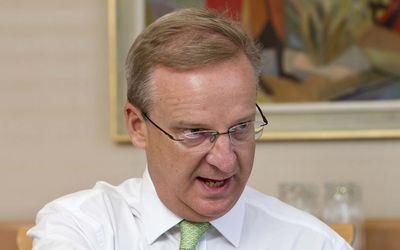NEDBANK has one major deal in its crosshairs this year — increasing its stake in Banco Unico so it can control the Mozambican bank.
CEO Mike Brown said on Wednesday Nedbank would raise its 36.4% stake in that country’s sixth-largest bank — bought in 2014 — to 50% plus one share at a R178.4m cost.
He expects the deal to close in the first half of this year.
The JSE-listed lender has also invested in Ecobank Transnational, the pan-African banking group in which it owns a 20% stake.
The two investments yielded R871m in associate income for the year to end-December last year, for a 93.6% increase in headline earnings from rest of Africa operations, one of Nedbank’s four core units.
Mr Brown said Nedbank was on the lookout for another acquisition on the continent, which "needs to be financially, operationally and strategically sensible".
The group reported headline earnings of R10.8bn for the year to end-December, an increase of 9.6% from the previous year.
The corporate and investment banking unit remained the largest contributor to headline earnings at R5.2bn, followed by the retail and business banking unit at R4.5bn.
The bank declared a gross final dividend of R5.70 per share, bringing the full-year dividend to R11.07, a rise of 7.7%.
Patrice Rassou, the head of equities at Sanlam Investments, said the results were slightly below his projections, particularly the payout to shareholders.
"Dividends growth was behind my expectations, given the group’s good capital position," he said.
The bank has appointed Ciko Thomas, its consumer banking managing executive, to head the retail and business banking unit, taking over from Philip Wessels, who has retired two years early to spend more time with his family.
Under Mr Thomas, the consumer banking segment more than doubled headline earnings, to R337m last year. The segment forms part of the wider retail and business banking unit.
"(Mr Thomas) was the main driver behind making Nedbank a brand that would resonate with the broader South African customer, compared to a top-end focus before," said Mr Rassou. "He had a big hand in turning around the retail division."
Nedbank’s impairments rose 6.3% to R4.8bn, although its credit loss ratio — impairment charges as a percentage of gross loans — lifted slightly to 0.77% from 0.79%.
Mr Brown attributed the lower credit loss ratio to the higher quality of its overall loan book, which improved in a higher interest rate environment, as a result of stricter lending policies in the past two to three years.
The retail bank managed to lower bad debts, but this was scuppered by higher bad debts elsewhere.
Corporate and investment banking had an elevated credit loss ratio of 0.4% last year, compared with 0.19% the previous year. The rest of Africa unit suffered credit losses of 1.25%, up 1.02 percentage points.
"This is almost exclusively from the impact … of the commodity price collapse," Mr Brown said.
The bank was slowly diversifying its exposure away from the commodity segment, turning towards infrastructure projects for business, Mr Brown said. It has a R45bn pipeline in that sector.



















Change: -1.52%
Change: -1.45%
Change: -2.04%
Change: -0.88%
Change: -3.28%
Data supplied by Profile Data
Change: 0.01%
Change: -0.15%
Change: -1.52%
Change: 0.00%
Change: -0.32%
Data supplied by Profile Data
Change: 1.01%
Change: 0.45%
Change: 0.76%
Change: 0.82%
Change: 0.23%
Data supplied by Profile Data
Change: -2.40%
Change: -3.32%
Change: -3.66%
Change: -3.81%
Change: -1.15%
Data supplied by Profile Data